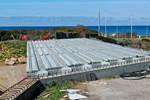Arkema, Sireg Geotech introduce bendable rebar
Sireg Glasspree TP bars, manufactured with Elium thermoplastic resin provides the construction industry with a recyclable, strong and energy-efficient rebar option over steel.

Source | Sireg Geotech
Arkema (Cologne, Germany and King of Prussia, Pa., U.S.) and Sireg Geotech (Arcore MB, Italy) have developed what is claimed to be the world’s first bendable composite rebar, providing an alternative to traditional steel reinforcement in construction.
The rebar is a combination of Sireg’s Glasspree TP fiberglass bars and Arkema’s Elium recyclable thermoplastic resin. The use of Elium gives the rebar double the tensile strength of steel, the companies report. Moreover, the novel rebar is lightweight (75% lighter than steel), corrosion-proof and chemically resistant, and it offers dimensional stability even in the event of extreme thermal changes. Fully recyclable, the bendable rebar contributes to energy-efficient structures and reduces the carbon footprint of maintenance activities.
Moreover, the use of Elium ensures a major gain in productivity as well as greater flexibility for the supply of composite reinforcement, thus improving the overall profitability of construction projects, Arkema notes. Construction, maintenance or repair of buildings, bridges, tunnels, as well as marine and coastal structures are some key application areas, demonstrating the rebars’ adaptability. For bridges in particular, both companies ensure an estimated service life twice that of steel (100 years).
Related Content
-
Plant tour: Teijin Carbon America Inc., Greenwood, S.C., U.S.
In 2018, Teijin broke ground on a facility that is reportedly the largest capacity carbon fiber line currently in existence. The line has been fully functional for nearly two years and has plenty of room for expansion.
-
Combining multifunctional thermoplastic composites, additive manufacturing for next-gen airframe structures
The DOMMINIO project combines AFP with 3D printed gyroid cores, embedded SHM sensors and smart materials for induction-driven disassembly of parts at end of life.
-
Bio-based acrylonitrile for carbon fiber manufacture
The quest for a sustainable source of acrylonitrile for carbon fiber manufacture has made the leap from the lab to the market.













